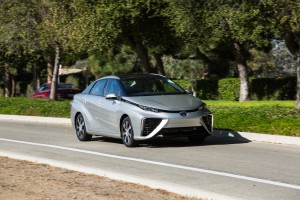
Toyota leads the way in fuel-cell technology with the Mirai. Officials believe fuel cells are best for moving large vehicles with zero emissions.
Fuel cells using hydrogen remain the best alternative for moving heavy vehicles such as buses and trucks over long distances with zero emissions.
Justin Ward, general manager, Powertrain Systems Controls at Toyota Engineering and Manufacturing North America, iterated his support for the fuel cell during a panel discussion on the future of mobility as the annual Society of Automotive Engineers Congress got underway in Detroit.
Battery electric vehicles remain the best alternative for short trips in urban areas, while hybrids and plug-in hybrids can work well for consumers who need a larger vehicle. But fuel cells work especially well in larger vehicles such busses and heavy-duty trucks, said Ward, noting extended duty cycles in big vehicles can help cover the cost of fuel cells.
Ward also stressed that Toyota has successfully operated experimental fuel-cell vehicle, the Mirai in Japan and the U.S. starting last year. Toyota has been a major investor in fuel cells and believes the technology is one of the key to achieving zero emissions.
“But we think the cost reductions have just started,” said Ward, who noted the Mirai costs only 1/20th of what Toyota spent on the original prototype.
Bryan Pivovar, senior scientist-Fuel Cells at the National Renewable Energy Lab in Golden, Colorado, said the wider use of hydrogen as the replacement for petroleum-based products in industry and transportation holds the key to “de-carbonizing” the global economy.
(Toyota teams with Clemson grad students on uBox concept. For more, Click Here.)
“It is inevitable,” he said, when all of the demands of transportation energy are taken into consideration, since new international agreement signed recently in Paris call for reducing greenhouse-gas emissions 83% by 2050. A reduction of this magnitude is needed to fight climate change, he said.
In addition, Pivovar said the future of transportation will be hydrogen-based because it can be made from a variety of sources and applied across industries. It also creates jobs, enhances national energy security and is tremendously efficient, he added.
Pivovar also noted U.S. Department of Energy estimates fuel cell R&D costs will decline 80% by 2030, making it a viable alternative even when petroleum prices are low.
Larry Burns, the former vice president of research at General Motors and a leading advocate of fuel cell technology during the last two decades, who is now a consultant technology, also told the panel that other trends will help make fuel cells more practical.
(Click Here for details about the FBI’s warning about cyber hacking of vehicles.)
Infrastructure has been an issue for fuel cells but the coming deployment of autonomous vehicles will simplify refueling by making it easier to have vehicles refueled because they can be sent to centralized stations, Burns noted.
Mike Ableson, vice president, Strategy and Global Portfolio Planning at General Motors, said the auto industry, despite major technical advances, has not transformed itself since Karl Benz’s day.
But the combination of connectivity, autonomy and alternative transportation services will force dramatic change, he said.
At the same, Burns said the changes will significantly reduce the societal cost of automobiles by making them far more cleaner safer and much more efficient because they will weigh significantly less than today’s vehicles.
(To see more about the Justice Dept.’s call for cooperation to thwart auto cyber hacking, Click Here.)
In addition, making vehicles vastly safer will curb an epidemic of traffic fatalities that now claims the lives of than 1.2 million people around the globe annually. Curbing the epidemic is the most compelling reason to push ahead with the development of autonomous vehicles, added Burns, who described as a “moral imperative.”
